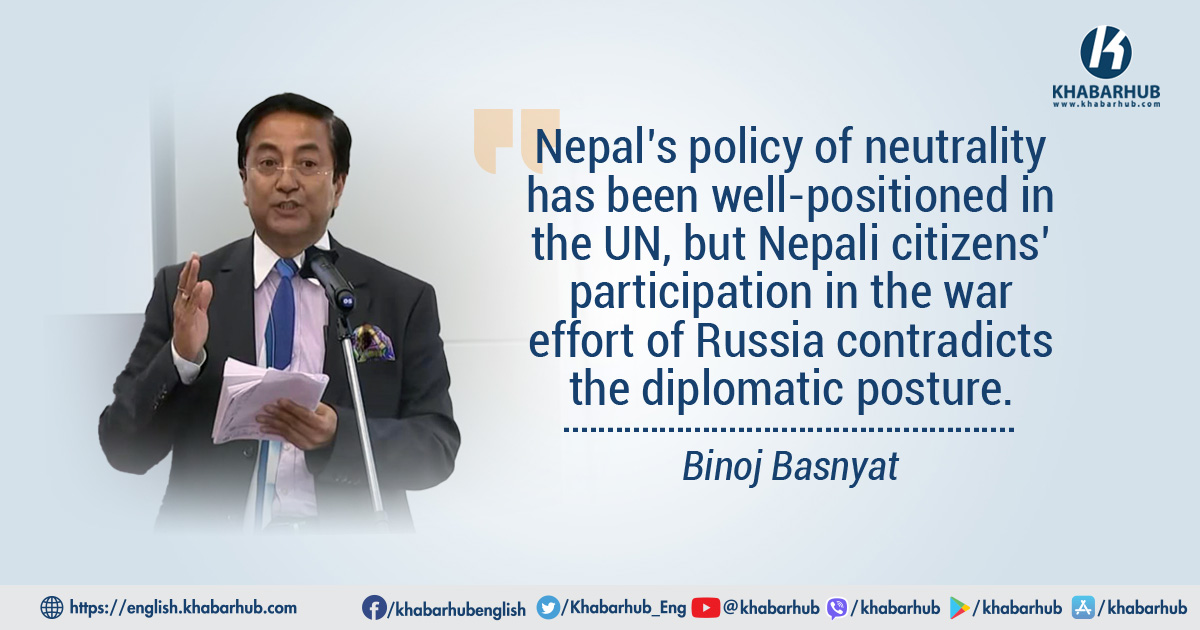A need arises for an analysis of Nepal’s foreign policy, along with a comprehensive study of diplomatic behavior and positions on international issues, guiding and echoing strategies toward global occurrences.
The world, with its complexities, will likely witness many other proceedings that capture world attention, particularly by global political influencers and the United Nations Security Council.
The last two years have seen two emergency proceedings: one on the Russian offensive on Ukraine and the second on the Israel-Hamas war.
Both the world and regions, powerful and small nations alike, are divided on their diplomatic standings.
The Himalayan dilemma between China and India and the unfolding events in the waters around the Taiwan straits will call for the attention of great powers, further positioning diplomatically for other states.
Nepal’s foreign policy towards Russia’s offensive on Ukraine sheds light on the factors influencing its approach and strategic decisions.
As a landlocked country nestled between two regional superpowers, China and India, Nepal’s foreign policy choices are heavily influenced by geopolitical considerations stemming from these relationships.
Nepal, a geographically small but culturally rich nation, has historically pursued a non-aligned foreign policy, prioritizing peace, neutrality, and cooperative relations with nations from both the Eastern and Western blocks.
Therefore, in understanding Nepal’s diplomatic behavior in the Russia-Ukraine war, we must consider its historical ties, geopolitical position, and domestic political landscape. Of the six resolutions of the UN emergency sessions, Nepal supported four and abstained in two.
Historical Background
Nepal supported the ‘Triple Entente’ during WWI and the ‘Allies’ during WWII.
With UN membership, regional geopolitics, and the domestic political environment, Nepal’s foreign policy has evolved significantly, adhering to the principles of non-alignment and maintaining friendly relations with both superpowers, the United States and the Soviet Union, during the Cold War.
This neutrality assisted in being part of the Non-Aligned Movement approach and allowed Nepal to receive economic assistance for development efforts from multiple sources, enabling its socio-economic development and securing a political-diplomatic standpoint.
Nepal abstained from ES-11/3, adopted on 7 April 2022, which aimed to suspend the membership of Russia in the UN Human Rights Council over grave concern at the ongoing human rights humanitarian crisis.
Even after the collapse of the Soviet Union, Nepal continued its non-alignment stance, forming the basis of its foreign policy today and questioning the principles of the NAM and the effectiveness of the UN.
Geopolitical Position and National Interest
As a landlocked country nestled between two regional superpowers, China and India, Nepal’s foreign policy choices are heavily influenced by geopolitical considerations stemming from these relationships.
Nepal shares a long and porous border with India, resulting in significant trade and people-to-people exchanges.
India has historically exercised great influence over Nepal’s political, economic, and security matters.
China is currently the highest source of FDI and has promised to be the source of linking Nepal to the outer world for trade and investment.
The US and China rivalry, along with China and India cooperation, competition, and conflict, surrounds Nepal.
Therefore, Nepal’s policy-making often revolves around maintaining a balanced relationship with the only superpower, the US, and its southern and northern neighbors.
Russia-Ukraine War and Nepal’s Position
Considering Nepal’s “Non-Alignment” policy, it refrains from taking sides in international conflicts.
The Russia-Ukraine war is no exception. Nepal has not issued any official statements or explicit support for either party involved in the conflict.
Nepal adheres to its long-standing principle of respecting the sovereignty and territorial integrity of nations, thus maintaining neutrality in this issue.
This stance not only aligns with Nepal’s non-aligned principles, but it also serves its national interest by avoiding confrontation with any major power.
The United Nations General Assembly Resolution ES 11/1, sponsored by 96 countries and passed with 141 voting in favor, 5 against, and 35 abstentions, was adopted on 2 March 2022.
The resolution condemned the invasion of Ukraine, called for the full withdrawal of Russian forces, reversed its pronouncement to accept the self-declared People’s Republic of Donetsk and Luhansk, and confirmed Belarus’s unlawful use of force against Ukraine.
Resolution ES 11/2, adopted on 24 March, reiterated the UN’s former assurances and commitments under its Charter for Russia’s withdrawal, as well as voiced serious concern over and condemned attacks on civilian populations and infrastructure.
The rise in unemployment and lack of stern government policies have been creating an environment for youths in search of opportunities worldwide.
Nepal abstained from ES-11/3, adopted on 7 April 2022, which aimed to suspend the membership of Russia in the UN Human Rights Council over grave concern at the ongoing human rights humanitarian crisis.
The resolution was passed with the approval of 93 countries.
ES 11/4, adopted on 12 October 2022, declares the referendum held in Donetsk, Kherson, Luhansk, and Zaporizhia as illegal and against international law, as it was conducted under disputed circumstances and unrecognized by the international community.
The resolution was passed with an overwhelming vote of 143 in favor, 5 against, and 35 abstaining—more than ES-11/1, which demanded Russia withdraw its forces from Ukraine.
Nepal also abstained in ES-11/5, adopted on 14 November 2022, calling for Russia to pay war reparations to Ukraine by creating an international reparations mechanism.
The resolution ES-11/6, adopted on 23 February, is about the principles of the charter inspiring a comprehensive, just, and lasting peace in Ukraine.
Nepal has stood firm in avoiding taking postures but also abstained from paying reparations by Russia and the issue of Human Rights.
Factors Influencing Nepal’s Diplomatic Behavior
Three main agendas stand forefront. One is diplomatic pragmatism: Nepal’s foreign policy is characterized by diplomatic pragmatism, focusing on economic development, international cooperation, and maintaining its independence.
By not taking sides in the Russia-Ukraine conflict, Nepal avoids compromising its bilateral relations with any of the involved parties.
Second is economic considerations: Nepal heavily relies on economic assistance from a variety of sources, including countries involved in the Russia-Ukraine conflict.
Taking a clear stance on this issue could potentially jeopardize its economic stability and development projects, emphasizing the need for neutrality.
Finally, domestic politics: Nepal’s domestic politics also play a role in shaping its foreign policy decisions.
Frequent political transitions, coalition governments, and internal stability concerns limit the scope for actively engaging in international conflicts.
The reaction has three leading factors plus a division into two folds. The bigger nations are driven by strategic interests, and Nepal as a small nation is influenced by both national interests and international principles.
As the political situation in Nepal remains delicate, the government prioritizes internal stability and economic development over involvement in external conflicts.
Youths in Russia’s War
The rise in unemployment and lack of stern government policies have been creating an environment for youths in search of opportunities worldwide.
Together with the change in Russia’s policies for open recruitment with the temptation of monetary benefits and the provision of citizenship.
On the domestic front, together with the August 1st statement from the Ministry of Foreign Affairs cautioning and asking Nepali youths not to join mercenaries of any country in violation of existing treaties and agreements, at least six youths serving in the Russian army were killed in December, almost two years into the Russian invasion of Ukraine.
With their deaths, the government has asked Moscow not to recruit its citizens into the Russian military.
The statement said, “The government of Nepal has requested the Russian government to immediately return their bodies and pay compensation to their families.”
When the government is looking inexplicable, the citizens seem not answerable due to compulsion and desperation to high unemployment. Millions of Nepali nationals are employed in other countries.
President Putin’s decree of May has permitted foreign nationals into the Russian Forces, paving the way for human traffickers and an unauthorized mechanism to abet unemployed youths to be part of the force, entering as students and tourists.
While Ukraine is holding Nepali citizens as prisoners of war fighting for Russia, it has also urged the government to immediately stop the activities of youths joining the Russian military or face a diplomatic decline in the relationship.
Conclusion
The reaction from Nepal is understandable, as the country gives precedence to its national interests.
Nepal, through its diplomatic channels and international engagements, continues to advocate for a peaceful resolution and the respect of the sovereignty and territorial integrity of all nations involved.
Its response is an outcome of its geographical setting and apprehensions, being at the center of a power dispute between China and India.
The small economy of Nepal is susceptible to peripheral dynamics and could experience short-term growth inconsistencies.
The reaction has three leading factors plus a division into two folds. The bigger nations are driven by strategic interests, and Nepal as a small nation is influenced by both national interests and international principles.
This is realism in statecraft with a belief that Nepal is the principal actor in the international system.
The first factor is resentment, the sensitivity of small nations that feel they have been treated unfairly.
The second is apprehension, suspicion that the South Asian situation will revert to the regional environment of the 1970s, and the argument if the state of affairs will come to its own borders.
Nepal’s policy of neutrality has been well positioned in the UN, but Nepali citizens’ participation in the war effort of Russia contradicts the diplomatic posture.
It leads to the loss of international political trust as well as diplomatic unease and apprehension. Contradicting Nepal’s “Non-Aligned” foreign policy as well as its long-held stance at the UN gives rise to political unaccountability.
Nepal’s diplomatic behavior and political position in the Russia-Ukraine war demonstrate its commitment to a “Non-Aligned” foreign policy.
Due to its geopolitical position, historical ties, and national interest, Nepal maintains neutrality in international conflicts.
The Russia-Ukraine war does not directly affect Nepal’s national security or interests, allowing the country to focus on its economic development and regional relationships.
However, Nepal’s commitment to neutrality should not be mistaken as indifference to the plight of those affected by the conflict.
Nepal, through its diplomatic channels and international engagements, continues to advocate for a peaceful resolution and the respect of the sovereignty and territorial integrity of all nations involved.
(The author is a Strategic Analyst, Major General (Retd) of the Nepali Army, and is associated with Rangsit University, Thailand)









Comment